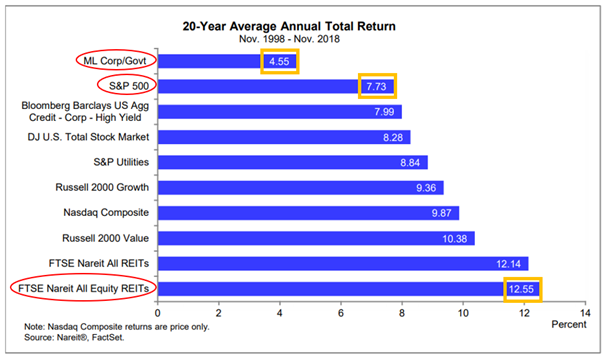The “Landlord Way” To Investing

This framework is very simple, puts income first, and allows for long term compounding to do its magic. Most importantly, this philosophy is perfectly applicable to the public stock market, particularly if you are a REIT investor.
The “Landlord Way” To Investing
While businesses (stocks) come and go, well-located properties (REITs) are here to stay with landlords cashing rent check after rent check regardless of the occasional tenant bankruptcies and/or ups and downs of the market.
Most businesses are more volatile than you would like to admit. They operate in rapidly changing markets and commonly have little protection in-place against new innovations or competitors that could cause significant harm to their businesses.
We have seen it time and time again where a highly successful company with a market-leading position would lose it all because a new innovation caused their product to become obsolete. As a Finnish citizen, the first example that comes to my mind is Nokia (NOK) which at one point controlled over 40% of the mobile phone market – just to lose most of it to Apple (AAPL) and Samsung (OTC:SSNLF) a few years later. It goes without saying that shareholders, including myself, suffered enormous losses and this is just one example among many others.
This led me to REITs which allowed me to invest like a landlord would.Unlike most traditional businesses, landlords (and REITs) benefit from many risk-mitigating factors that allow them to earn much more consistent and predictable returns over time.
- Landlords participate in the profit earned by their tenants through rents that are contractually guaranteed, often for many years to come.
- Landlords get paid first. Without a rent payment, a business cannot keep operating, and therefore, rents are even senior to debt payments in most cases.
- In the worst case, where a tenant goes bankrupt, landlords can simply release the same property to another tenant. The value of the previous tenant’s business may go to 0, but the landlord is in a much safer and stronger position to sustain value.
- As a scarce supply and essential part of our infrastructure, real estate provides durability and inflation protection – an important risk that should not be overlooked in today’s market environment.
Put simply, by investing in REITs, we take the role of a landlord and aim to achieve superior risk-adjusted returns than what most other stocks would provide us. Despite the many risk mitigating factors, REITs (VNQ) have historically outperformed the S&P500 (SPY) by a mile:

It is not however all sunshine and rainbow. Because REIT investors are exposed to daily volatility in price quotes, it is important for them to have strict guidelines to remain disciplined about their landlord approach to investing.
Guidelines for the “Landlord” REIT investor:
- Keep it simple: No complex business models, no high tech, nothing that may be unsustainable. If we don’t understand it, we just don’t touch it.
- Income first: We want appreciation, but most importantly, we want high and sustainable income.
- Consistency and predictability: Our targeted investments should be predictable and consistent in their performance. We dislike surprises, and value income we can count on.
- Long-term focused: We always ask ourselves if we would be happy to hold a given investment for a minimum of 5 years without any quotation.
- Owner mindset: We see REITs as real estate investments and not as stocks. We are real estate owners, not “stock market traders”. We mind fundamental performance of the properties and not the short-term share price performance.
- Ignore short-term volatility: REIT fundamentals are generally quite steady, but REIT market pricing can be very volatile. One must have a sufficiently long time horizon to endure the troughs in market prices.
- Focus on risk, not volatility: Risk is the possibility of a deterioration in business fundamentals. Volatility is the sentiment of the market expressed in the ups and downs of share prices. They are two different things, to our mind.
- Invested in all time periods: We believe in “time in the market” rather than “timing the market”. There will be inevitable ups and downs, but just like owners of buy-and-hold rental properties, we do not trade in and out of our REIT investments based on short-term price variations. When opportunities are rare, we enjoy dividends and set cash aside, and when opportunities become abundant, we do not hesitate to put capital to work.
By sticking to these simple guidelines, investors can start perceiving their REIT investments as if they would be rental properties. You won’t be tempted anymore to sell your shares at inopportune times due to market volatility. And you will forget about price quotes and other irrelevant metrics such as volatility.
Rather, you will become a true real estate investor who thinks long term, focuses on the income and lets investments compound.
It is exactly this change in investment mindset that was the biggest turning point in my early investment career. Going from a traditional “investor” mindset to that of a “landlord” led to improved performance, more consistent results, and less stress.
Ending Remarks
Our investment strategy is not rocket-science. We aim to buy properties at less than what they are worth in order to achieve high income and capital appreciation. That’s it. It is just common sense that such strategy, when implemented correctly, can lead to attractive investment results.
To achieve this, we use REITs and other real estate securities that are actively traded on public stock exchanges. They allow us to invest in almost any property type in a liquid manner with low transaction cost, instant diversification, and professional management. Even better, we believe that this market functions inefficiently with regular mispricings allowing us to buy into real estate investments at discounts and superior yields to what is achievable in private markets. This strategy has served me well over time, and allowed me to greatly improve the returns that I was earning before following this investment philosophy.
Source: seekingalpha.com















 Accessibility
Accessibility